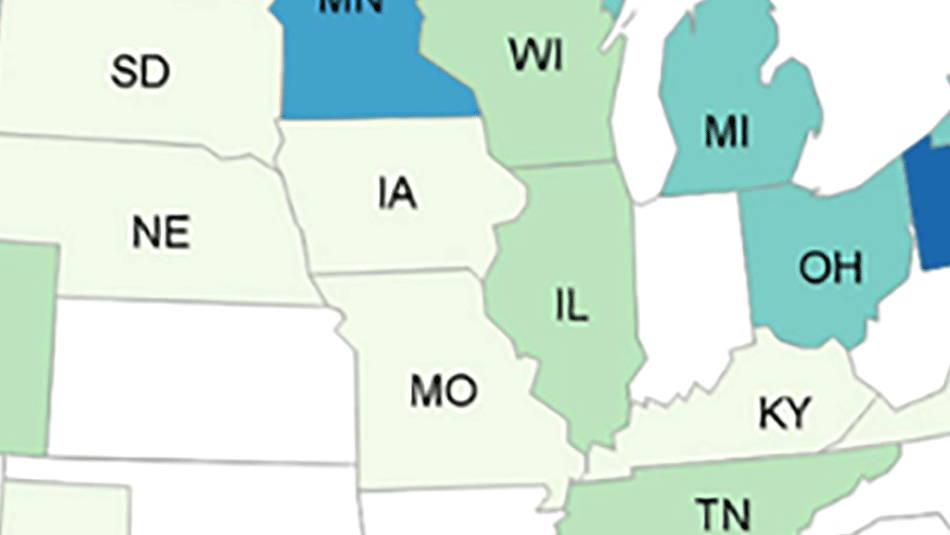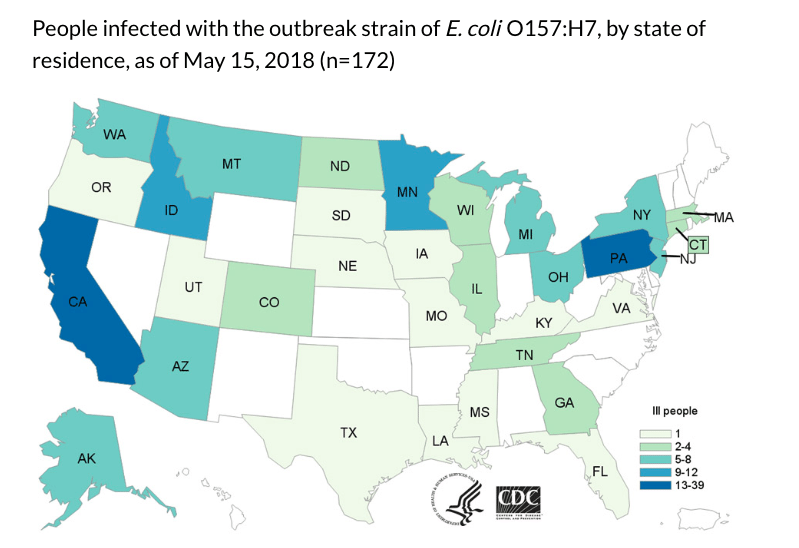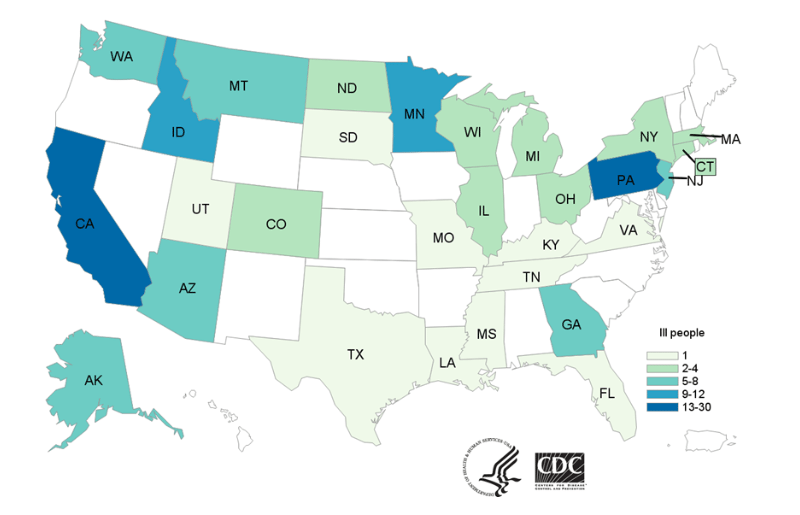Updated: May 17, 2018 at 9:05 a.m.
Videos by Wide Open Country
The CDC updated the E.coli outbreak report, adding 23 more reported illnesses to the case count. Officially, 172 people are affected by the recent outbreak linked to romaine lettuce from the Yuma, Arizona region and 75 hospitalizations have occurred. Three more states were added to the list: Iowa, Nebraska, and Oregon.
The updated case map and case count for each state is below. In the newest case update, the CDC found that the last shipments of romaine lettuce from the Yuma growing region were harvested on April 16, 2018 and the harvest season is effectively over. It is unlikely that any romaine from the Yuma region is still available in stores or restaurants due to its 21-day shelf life. They also stated that it takes about two to three weeks between a person's illness and the CDC officially reporting it under a case count.
- Alaska: 8 cases
- Arizona: 8 cases
- California: 39 cases, 1 death
- Colorado: 3 cases
- Connecticut: 2 cases
- Florida: 1 case
- Georgia: 4 cases
- Idaho: 11 cases
- Illinois: 2 cases
- Iowa: 1 case
- Kentucky: 1 case
- Louisiana: 1 case
- Massachusetts: 3 cases
- Michigan: 5 cases
- Minnesota: 12 cases
- Mississippi: 1 case
- Missouri: 1 case
- Montana: 8 cases
- Nebraska: 1 case
- New Jersey: 8 cases
- New York: 5 cases
- North Dakota: 2 cases
- Ohio: 6 cases
- Oregon: 1 case
- Pennsylvania: 21 cases
- South Dakota: 1 case
- Tennessee: 3 cases
- Texas: 1 case
- Utah: 1 case
- Virginia: 1 case
- Washington: 7 cases
- Wisconsin: 3 cases
Updated: May 9, 2018 at 3:25 p.m.
The CDC updated its report on the current E.coli outbreak today. The total number of cases in the outbreak is 149 reported, making it the worst E.coli outbreak in over a dozen years. 29 states are now affected, and 64 hospitalizations have occurred. Of those 64 hospitalizations, 17 people developed hemolytic uremic syndrome, a type of kidney failure you can learn more about below. Additionally, the updated map of illnesses and list of state cases is below.
The CDC reports that the age range of those who have fallen ill ranges from 1 to 88 years old, with a median age of 30. About 65 percent of those with reported illnesses are female.
- Alaska: 8 cases
- Arizona: 8 cases
- California: 30 cases, 1 death
- Colorado: 2 cases
- Connecticut: 2 cases
- Florida: 1 case
- Georgia: 5 cases
- Idaho: 11 cases
- Illinois: 2 cases
- Kentucky: 1 case
- Louisiana: 1 case
- Massachusetts: 3 cases
- Michigan: 4 cases
- Minnesota: 10 cases
- Mississippi: 1 case
- Missouri: 1 case
- Montana: 8 cases
- New Jersey: 8 cases
- New York: 4 cases
- North Dakota: 2 cases
- Ohio: 3 cases
- Pennsylvania: 20 cases
- South Dakota: 1 case
- Tennessee: 1 case
- Texas: 1 case
- Utah: 1 case
- Virginia: 1 case
- Washington: 7 cases
- Wisconsin: 2 cases
Updated: May 2, 2018 at 3:48 p.m.
The CDC reported that the first death from E.coli occurred in California. Since April 26, 23 more people were added to the investigation, bringing the total number of cases to 121 across 25 states with 52 hospitalizations and one death. There is no national recall for romaine lettuce yet from the Food and Drug Administration.
The updated list of states follows. Kentucky, Massachusetts, and Utah were added. Lettuce from the Yuma area of Arizona is still likely the cause, as it is the common ingredient in most (if not all) of these cases.
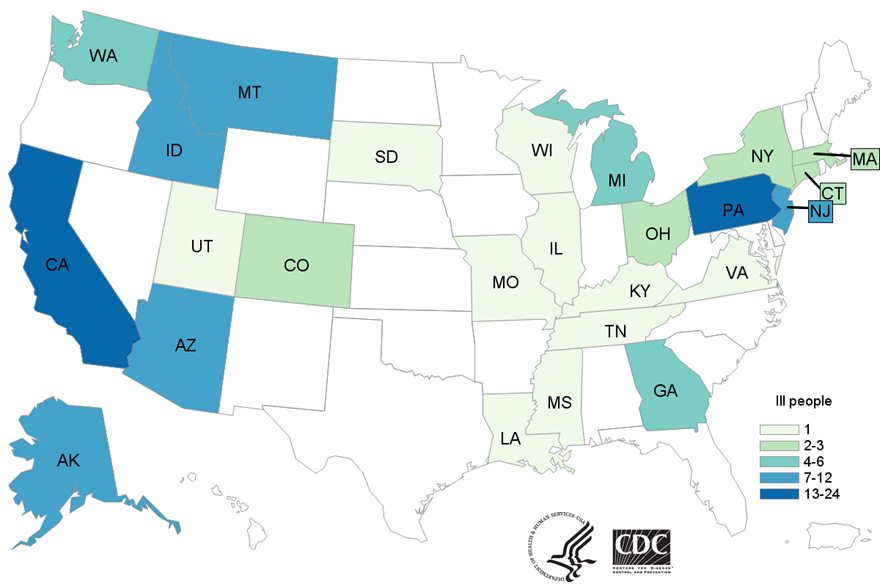
CDC
- Alaska: 8 cases
- Arizona: 8 cases
- California: 24 cases, 1 death
- Colorado: 2 cases
- Connecticut: 2 cases
- Georgia: 4 cases
- Idaho: 11 cases
- Illinois: 1 case
- Kentucky: 1 case
- Louisiana: 1 case
- Massachusetts: 2 cases
- Michigan: 4 cases
- Mississippi: 1 case
- Missouri: 1 case
- Montana: 8 cases
- New Jersey: 7 cases
- New York: 2 cases
- Ohio: 3 cases
- Pennsylvania: 20 cases
- South Dakota: 1 case
- Tennessee: 1 case
- Virginia: 1 case
- Washington: 6 cases
- Wisconsin: 1 case
In addition to the romaine outbreak of Escherichia coli, over 2 million eggs recalled for salmonella concerns. To learn about that recall, read our report here.
Updated: April 26, 2018 AT 8:34 a.m.
On April 25, the CDC updated the case outbreak information to include 31 more illnesses, bringing the total number of cases to 84. The most recent illness occurred on April 12, 2018. Of the 84 cases, 42 have resulted in hospitalizations. Three more states have also been added to the list, so the full updated list and case counts are below.
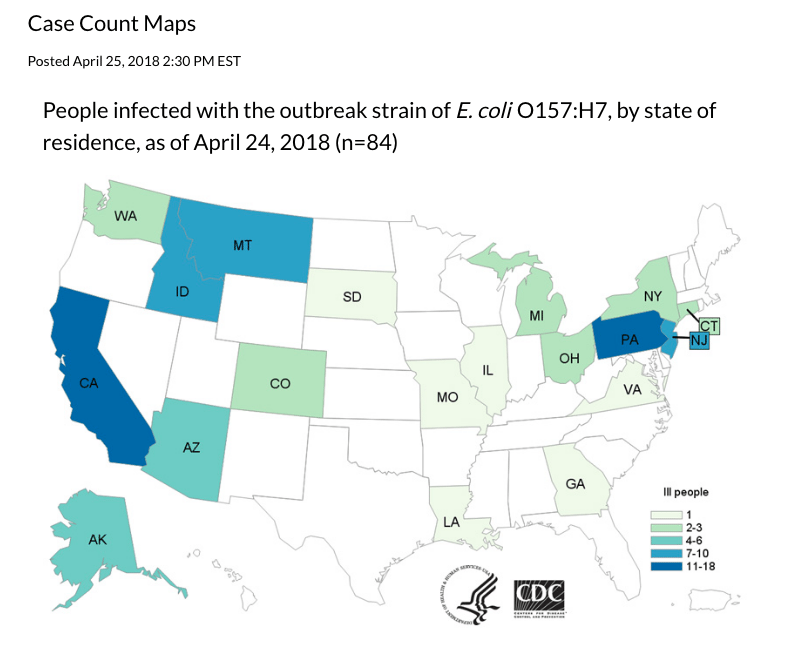
CDC
- Alaska: 5 cases
- Arizona: 5 cases
- California: 13 cases
- Colorado: 2 cases
- Connecticut: 2 cases
- Georgia: 1 case
- Idaho: 10 cases
- Illinois: 1 case
- Louisiana: 1 case
- Michigan: 2 cases
- Missouri: 1 case
- Montana: 7 cases
- New Jersey: 7 cases
- New York: 2 cases
- Ohio: 3 cases
- Pennsylvania: 18 cases
- South Dakota: 1 case
- Virginia: 1 case
- Washington: 2 cases
The Chicago Tribune reported that eight sick prisoners at a facility in Nome, Alaska gave clues to determine that the romaine outbreak stems from Yuma, Arizona, but there is still no source information.
This E.coli strain is especially dangerous because it produces a Shiga toxin that can cause major damage to the way your kidneys function. Bloody diarrhea, vomiting, and cramping are the three most noteworthy symptoms.
FDA spokesman Peter Cassell stated that no single farm has been identified as the location of the national contamination. We'll continue to report on this story, providing updates, until the outbreak is over.
Updated: April 19, 2018 at 9:19 a.m.
As of April 19, 18 more people have reported E. coli O157:H7 infections. Nine more consumers have been hospitalized, and two are suffering from a type of kidney failure known as hemolytic uremic syndrome. There are now 53 reported, confirmed cases of E. coli. Five more states have been added to the list of affected regions. The full and updated list of states follows.
- Alaska: 1 case
- Arizona: 3 cases
- California: 1 case
- Connecticut: 2 cases
- Idaho: 10 cases
- Illinois: 1 case
- Louisiana: 1 case
- Michigan: 1 case
- Missouri: 1 case
- Montana: 6 cases
- New Jersey: 7 cases
- New York: 2 cases
- Ohio: 2 cases
- Pennsylvania: 12 cases
- Virginia: 1 case
- Washington: 1 case
The original story, published on April 17, 2018 at 11:36 a.m. follows.
In January, romaine lettuce was pinned as the cause of a deadly E. coli outbreak in the United States and Canada. Now, a new outbreak of E. coli linked to romaine lettuce is sweeping through 11 states and counting as 35 infections were reported between March 22 and March 31. The Centers for Disease Control and Prevention reports that people aged 12 through 84 have been affected, and of those, 22 people have been hospitalized for severe symptoms. Of the 22, three people developed hemolytic uremic syndrome, a type of kidney failure in the multistate E. coli outbreak.
The CDC announced a full investigation of the outbreak in early April and since has narrowed down the cause to lettuce grown in the Yuma region of Arizona. The investigation, however, has not revealed a specific common grower, supplier, brand, or distributor. This recall is not connected to the January 2018 recall, the CDC notes, but the agency is asking consumers to exercise caution when purchasing store-bought chopped romaine lettuce or leafy greens at the store. This includes salads, salad mixes, and other forms of purchase. The CDC believes that prepared, ready-to-eat salads across the country could contain the contaminated lettuce.
The CDC and the U.S. Department of Agriculture are asking consumers to throw away all salads and salad mixes purchased that list ingredients from the Yuma, Arizona region. The agency also urges customers to wash and sanitize your refrigerator that stored the lettuce. More than 90 percent of the consumers that reported E. coli illnesses ate romaine lettuce the week prior to the illness, including those served salads at local restaurants and sold in grocery stores.
Food Safety News reports that bagged, mixed salads at Market District, a regional grocery chain, were specifically compromised in four different varieties under the "Great to Go" brand. The publication also reports that some of the prepared meals tainted include chicken caesar salad, chicken and bacon salad, and a chef's salad with ham, turkey, and hard boiled eggs.
The products were shipped to retail locations in Ohio, Pennsylvania, Indiana, and West Virginia. The information of these recalled items are as follows, provided by Food Safety News.
- 11.5 oz., clear plastic containers of ready-to-eat "CAESAR SALAD WITH CHICKEN." The product label is marked "Great to Go" by Market District and has a sell-by date of 04/13/18-04/16/18. The case code is 81571201542.
- 14.4 oz., clear plastic containers of ready-to-eat "CHICKEN AND BACON" salad. The product label is marked "Great to Go" by Market District and has a sell-by date of 04/13/18 - 04/16/18. The case code is 81571201541.
- 14.1 oz., clear plastic containers of ready-to-eat "CHEF SALAD WITH HAM, TURKEY, & HARD-BOILED EGG." The product label is marked "Great to Go" by Market District and has a sell-by date of 04/13/18 - 04/16/18. The case code is 81571201543.
- 13.1 oz., clear plastic containers of ready-to-eat "CHEF SALAD WITH HAM, TURKEY, & HARD-BOILED EGG." The product label is marked "Great to Go" by Market District and has a sell-by date of 04/13/18 - 04/16/18. The case code is 81571201545.
So far, health officials through the CDC have mapped the reported cases of E. coli infections in this link. Here are the reported states and numbers of cases in each. You can follow along as they update their map here.
- Connecticut: 2 cases
- Idaho: 8 cases
- Illinois: 1 case
- Michigan: 1 case
- Missouri: 1 case
- New Jersey: 7 cases
- New York: 2 cases
- Ohio: 2 cases
- Pennsylvania: 9 cases
- Virginia: 1 case
- Washington: 1 case
E. coli 0157 is a dangerous infection that includes symptoms like diarrhea, severe stomach cramps, and vomiting. While most people recover within a week, young children, older adults, and those with weakened immune systems are most susceptible to the life-threatening effects of the infection.
If you have symptoms of E. coli, the CDC asks that you talk to your doctor, confirm what you ate the week before you were sick, and report your illness to the health department.

